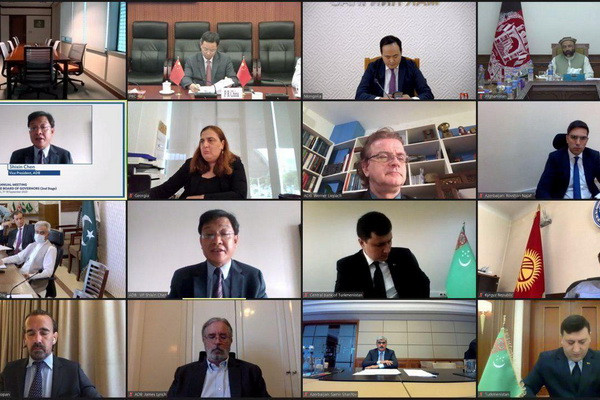On 17-18 September, the Annual Meeting of the Board of Governors of the Asian Development Bank (ADB) was held in the format of a videoconference, within the framework of which a High-Level Session of the Central Asia Regional Economic Cooperation (CAREC) dedicated to regional cooperation was also held during a pandemic and determining further steps to eliminate its economic consequences.
During the Annual Meeting, the Governors of ADB member countries familiarized themselves with the reports of the Bank’s procedural committee and the results of ADB’s financial activities for 2019, according to which, for the financing of approved projects for the period under review, US$21.6 billion was allocated in the form of credit lines and grants, which allowed to provide Fulfill the target set back in 2015 to double funding to combat climate change to US$6 billion ahead of schedule – 1 year ahead of schedule. Moreover, separate Cooperation Programs were adopted with Uzbekistan, Armenia, Azerbaijan, Bhutan, Cambodia, Fiji, Georgia and Nepal.
As part of the business session of the meeting, the ADB budget for 2020 was approved by voting by the members of the Board of Governors, the candidatures of the Chairman and Deputy Chairman of the ADB Board of Governors for 2020-2021 were approved, as well as the place and time of the 56th ADB Annual Meeting for 2023. – Tbilisi (Georgia).
As part of the agenda of the meeting, issues of further assistance by ADB to developing member countries in eliminating the consequences of the coronavirus pandemic were also considered – it was noted that ADB allocated US$9.3 billion for these purposes in the past 6 months.
“The COVID-19 pandemic has had a serious impact on developing member countries and impacted the global economy in an unprecedented way,” ADB incumbent President Masatsugu Asakawa said in his speech. “We are channeling all possible resources to fight the pandemic, responding quickly and on a large scale to ensure a positive financial flow and help the region recover as quickly as possible.”
The Asian Development Bank was founded in 1966, its main task is to stimulate economic growth in Asia through the provision of financing and technical assistance. Currently, together with the Bank in Uzbekistan, social and infrastructural investment projects are being implemented and developed in the field of health care, education, agriculture and water management, water supply and sewerage, construction and reconstruction of highways, electrification of railways, comprehensive development of basic infrastructure in the regions, etc.
Topical issues related to countering the global pandemic were also discussed during the CAREC High Level Session, held within the framework of the ADB Annual Meeting. Representatives of the countries participating in the program discussed the latest changes in the region, measures taken by each country to combat COVID-19, as well as further joint steps to resume international cooperation in the post-pandemic period.
Following the discussion, the participants in the CAREC session unanimously reaffirmed their firm commitment to further multifaceted international cooperation in order to develop effective solutions in the field of economic policy in the post-crisis period. A common position was also outlined on the need to continue funding the global health system in order to create the resources necessary for high-quality and timely provision of medical services to patients infected with coronavirus, and to take measures to reduce the spread of infection. It was decided to develop a plan of joint actions to expand economic and trade interaction and improve infrastructure connectivity between countries within the CAREC platform, which, in turn, will significantly contribute to further strengthening the economic well-being of the countries of the Asian region.
The Program for the Development of Regional Economic Cooperation in Central Asia (CAREC) was launched in 1997. at the initiative of the ADB. The goal of the Program is to promote the economic development of the Central Asian states by expanding regional and multilateral cooperation in priority areas.
Currently, 11 countries of the region participate in CAREC – Uzbekistan, China, Azerbaijan, Kazakhstan, Kyrgyzstan, Mongolia, Tajikistan, Afghanistan (since 2005), Pakistan, Turkmenistan (since 2010) and Georgia (since 2016), as well as international donor organizations: ADB, World Bank, IMF, EBRD, IDB and UNDP.







